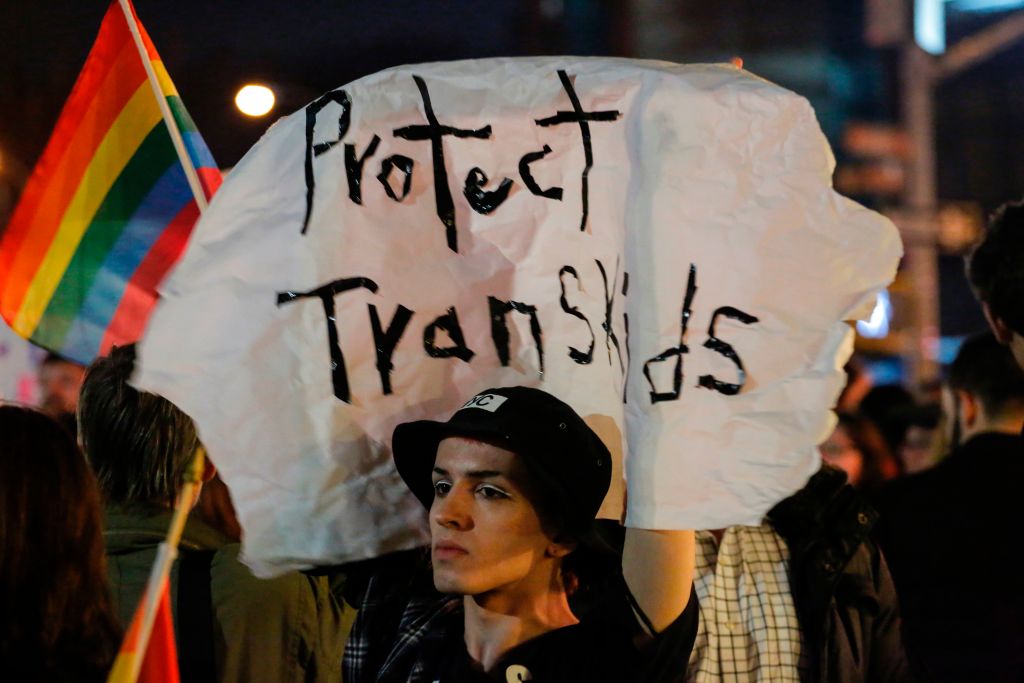The Alliance Defending Freedom (ADF), an anti-LGBTQ hate group, has yet another case it wants the Supreme Court to consider. This time, they’re hoping the justices will mandate that schools must segregate transgender students to single-use restrooms for the sake of other students’ “comfort.”
In its petition to the Court, ADF asks it to overturn a decision by the U.S. Court of Appeals for the Third Circuit that upheld a trans-inclusive policy at Boyertown Area Senior High School in southeastern Pennsylvania. The Third Circuit recognized that it is important to transgender students’ well-being to be recognized according to their gender identity and that excluding them from facilities is detrimental to both their physical and mental health. While the students ADF represents may have been uncomfortable, they are not suffering comparable discrimination or violations of privacy simply for being expected to share facilities with their transgender classmates.
ADF’s newest petition attempts to downplay the legitimacy of transgender identities while softening the severity of their ask — without actually changing it. In fact, they frame their request for segregating trans students as an accommodation, rather than a form of discrimination:
Boyertown never tried a comprehensive policy of making single-user facilities available to and providing support for students experiencing gender dysphoria. This would appear to be a logical first step to at least try before granting opposite-sex students access to locker rooms and restrooms where teenage students are undressing.
This sneaky “logical first step” argument ignores the fact that schools across the country have attempted this form of segregation and the consequences for transgender students are well documented. ADF has represented the losing party in several of the other court challenges that resulted when these discriminatory policies were challenged.
Because the students ADF represents suffer “embarrassment and distress,” they attempt to paint a false parallel with what transgender students experience. “The court rejected the suggestion that the dignity of students who identify as transgender could be respected by giving them access to single-user facilities,” they write, pretending that those students don’t already have such access. Noting that the Third Circuit found segregating trans students to be a form of discrimination, ADF quips, “Apparently, forcing Petitioners to use single-user facilities is not.”
While ADF calls for a policy that would force transgender students to only use single-user facilities, Boyertown’s policy doesn’t force any student out of any facility. ADF’s clients simply opt not to share facilities with their transgender classmates. Despite ADF’s claims, they are not being forced to do anything.
Throughout the petition, ADF frames transgender students as merely having “beliefs about their gender,” repeatedly misgendering and misidentifying them. Despite the ample research and evidence the Third Circuit relied upon, ADF frames the appellate court as having merely “speculated” that forcing trans students to use facilities that don’t match their gender identity “may exacerbate mental-health issues.”
ADF also refers to several debunked myths about transgender people. For example, they falsely argue that it’s not necessary to affirm trans students because an overwhelming majority of them will grow up to not be transgender. This “desistance myth,” based on older studies that broadly categorized gender nonconforming kids as “transgender,” has been widely disputed by many scholars and therapists. Ample new research demonstrates that young people’s mental health greatly benefits from being affirmed according to their gender identity. Nevertheless, ADF implies that this will lead to some kind of bathroom fraud, such that “a student may be in opposite-sex facilities under a presumption of being transgender, only to be properly diagnosed later as non-dysphoric.”
At another point, ADF subtly argues that the inclusive policy could be detrimental to transgender students because of “possible social pressures.” In a footnote, they reference a recent junk science study attempting to legitimize a completely fabricated diagnosis called “rapid onset gender dysphoria.” The study only interviewed members of the very anti-trans parent groups that invented the diagnosis — which isn’t recognized by any credible medical organization. It purports that young people are being motivated to become transgender through some kind of “social contagion” and that their identities are not legitimate.
In another footnote, ADF blatantly argues that gender dysphoria should be treated by working with transgender people to reject their gender identities — complete with a comparison to anorexia. “Petitioners do not claim to not know the best treatment for gender dysphoria,” the petition feigns, before improperly citing a Swedish study ADF believes proves that transitioning is not healthy. The author of that study, Cecilia Dhejne, has repeatedly rebuked attempts to distort her findings in this way, as research — including Dhejne’s — widely shows that affirming transition is the best way to support transgender people’s well-being.
The Supreme Court is now being asked to consider five different cases related to LGBTQ rights this session. One case involves an Oregon bakery seeking to discriminate against same-sex couples, two cases address whether it’s legal to fire someone for their sexual orientation, and in another case, ADF is also representing a funeral home fighting for the right to fire people for being transgender. The Court has not yet announced whether it will take up any of them.

